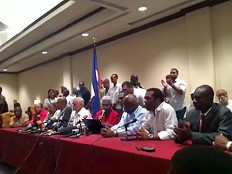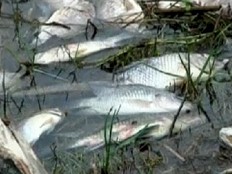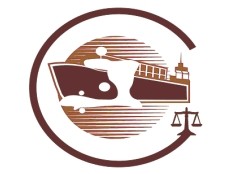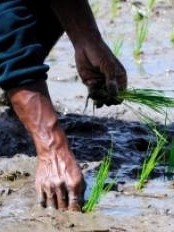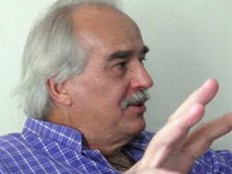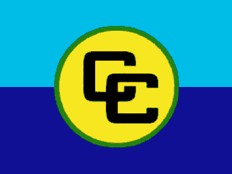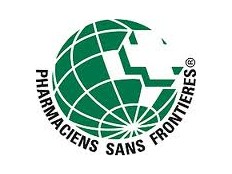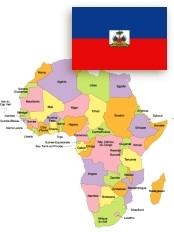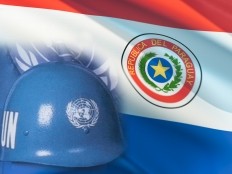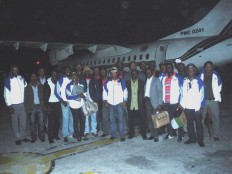The group of 12 [which are now 10] and which represents 19.37% of the vote, reiterated yesterday Wednesday, its positions which are : the cancellation of elections on 28 November, the departure of President René Préval the February 7, 2011 and the installation of a provisional government in order to hold new elections. "I give you a guarantee that on February 7, people will install a new president, at the head of an interim government, in replacement of René Préval to hold elections", said Jacques Edouard Alexis.
The "Members of the Group of 12" :
Charles Henri Baker "Regwoupman sitwayen pou espwa (Respè)» (2.38%)
Jean Henry Céant "Renmen Ayiti" (8.18%)
Joseph Michel Martelly "Repons peyizan" (disassociated)
Leslie Voltaire "Ansanm nou fò» (1.51%)
Jacques Edouard Alexis "Mobilisation pour le Progrès d'Haïti (MPH)" (3.07%)
Jeudy Wilson "Fòs 2010" (0.57%)
Josette Bijou (Independent) (1%)
Erick Smarcki Charles "Parti de l’Évolution nationale d’Haïti (PENH)" (0.24%)
Jean Chavannes Jeune "Alliance Chrétienne Citoyenne pour la Reconstruction d’Haïti (ACCRHA)" (1.80%)
Garaudy Laguerre "(WOZO)" (0.26%)
Leon Jeune "Konbit liberasyon ekonomik (KLE)" (0.36%)
Mirlande Hyppolite Manigat "Rassemblement des démocrates nationaux progressistes (RDNP)" (disassociated)
Total of votes expressed the November 28: 19.37%
Génard Joseph (Groupement Solidarité), arrived at the declaration of annulment of the vote, endorsed the position of the 12. After the conference, Yves Cristalin "Oganizasyon Lavni (LAVNI)" and Yvon Neptune "Ayisyen Pou Ayiti" have spoken in favor of canceling the poll.
Other candidates favorable to the cancellation of the poll:
2.84%
All candidates favorable to the cancellation of the poll: 22.21 % of votes expressed
Jacques Edouard Alexis recalled that the group has always been favorable to the formation of a provisional government and not of transition to manage the conduct of good elections with a new Electoral Council.
He also informed that the provisional government, whose group claims the installation is constitutional under Haitian law which is not the case according to him, for the amended election law, which would allow the head of the State to remain in power until May 14 (when he was sworn in 2006) - Remember that the constitution says the February 7 as the end of presidential mandate, but also refers to the period of 5 years of this mandate. It is on this last detail that the law allowing President Préval to stay until May 14, 2011, law voted by parliament and the Senate in May 2010.
For his part, Jean-Henry Céant reminded to the Head of State, by organizing the elections of 28 November, he pledged to leave office the February 7, "Mr. Préval can not use any constitutional ploy to justify its possible continuation to the head of state beyond the February 7"
In addition, Jacques Edouard Alexis said that the group does not recognize, as the Haitian Constitution, the expert mission of the Organization of American States (OAS) to conduct an audit of minutes. He said that the OAS is part of the problem and can not, under any circumstances, claim to be part of the solution. "We do not recognize this mission, nor the second round, that one wants to impose to us, It is necessary to have a provisional government to hold new elections" he says.
For his part, Charles Henri Baker, questioned the validity of the unilateral assessment by the OAS, of the election results of November 28 described as fraudulent. Believing that any serious investigation should lead to the cancellation of 90% of the minutes and therefore the poll "The electoral law was not applied, it cannot be question of recount of the minutes from operations of ballot stuffing".
The group of 12, called the population to remain mobilized to defend their rights, being convinced that "the parody of November 28th will not pass and will be cancelled".
See also:
http://www.haitilibre.com/en/news-1979-haiti-elections-rene-preval-at-the-power-until-may-14-2011.html
http://www.haitilibre.com/en/news-1952-haiti-elections-jacques-edouard-alexis-in-favor-of-a-provisional-government.html
http://www.haitilibre.com/en/news-1778-haiti-elections-12-candidates-calling-for-the-cancellation-of-elections.html
http://www.haitilibre.com/en/news-1782-haiti-elections-positions-of-18-candidates-face-the-annulation-of-the-poll.html
http://www.haitilibre.com/en/news-1859-haiti-elections-2010-preliminary-results-official-first-round.html
S/ HaitiLibre
Welcome! This blog was created purposely to gather local,national and international news and re-post them in one page to inform as much people as we can.
Search This Blog
12/30/2010
Haiti - Environment : The mystery of Lake Azuei resolved soon
Since December 24, dozens of dead fish were found on the shores of the "étang Saumâtre" also known as Lake Azuei and located about thirty kilometers east of Port-au-Prince, to the southeast of Haiti in the "plaine du Cul de Sac" and adjacent to the border with the Dominican Republic.
As probable causes of the death of fish, Michel Chancy, Minister of Agriculture suggests a possible imbalance of organic materials found in the lake. Hypothesis that seems to share the agronomist Arnoux Severin, head of the Transboundary Environmental Programme (PET), citing the proportion of limestone in the tons of fill piled on the shores of Lake Azuei which could increase the alkalinity of the lake. On the other hand, the decrease of the temperature of the lake could have consequences for some fish, adding that "the Tilapia are the only species that have been affected by this contamination".
Pierre Garo Nérée, Assistant Coordinator of the association Citizen Conscience for the Protection of the Environment of Haiti (Conscience Citoyenne pour la Protection de l'Environnement d'Haïti COCIPEH) expressed concern of the entire community, facing what he calls an ecological disaster "Fish died by dozens, see by thousands at Fond Parisien and Thomazeau" indicating that turtles were also found dead on Lake. Mr. Nérée remember that this catastrophe has severe economic impacts on the lives of the inhabitants of the area "The Lake Azuei and the market of Malpasse constitute the pillars of the economy in the region" inviting the Haitian authorities to shed full light on this issue.
The director of the section"Fisheries and Aquaculture" in MARNDR, Robert Badio, said for his part that this is not a new phenomenon in Haiti and said that authorities are activated in order to know the exact cause of these deaths.
Last Minute: The initial results of analysis conducted in Lake Azuei shows a lack of oxygen due to the use of calcareous materials in the heightening work of the road section affected by the rising waters of the lake, would be the cause of death of fish. "These materials come from the hills surrounding the lake rich in limestone. The dissolution and mixing of these compounds limestone appears to have temporarily changed the natural acidity of the water in this area, causing a scarcity of oxygen at the level of the lake". Additional analysis is underway to complete and confirm the initial results informs the government. If the results are confirmed, the fishing ban, the consumption and sale of fish could be lifted soon.
See also:
http://www.haitilibre.com/en/news-1990-haiti-environment-the-government-prohibits-the-consumption-of-fish-from-the-lake-azuei.html
http://www.haitilibre.com/en/news-1988-haiti-environment-dozens-of-fish-died-mysteriously-in-the-lake-azuei.html
BF/ HaitiLibre
As probable causes of the death of fish, Michel Chancy, Minister of Agriculture suggests a possible imbalance of organic materials found in the lake. Hypothesis that seems to share the agronomist Arnoux Severin, head of the Transboundary Environmental Programme (PET), citing the proportion of limestone in the tons of fill piled on the shores of Lake Azuei which could increase the alkalinity of the lake. On the other hand, the decrease of the temperature of the lake could have consequences for some fish, adding that "the Tilapia are the only species that have been affected by this contamination".
Pierre Garo Nérée, Assistant Coordinator of the association Citizen Conscience for the Protection of the Environment of Haiti (Conscience Citoyenne pour la Protection de l'Environnement d'Haïti COCIPEH) expressed concern of the entire community, facing what he calls an ecological disaster "Fish died by dozens, see by thousands at Fond Parisien and Thomazeau" indicating that turtles were also found dead on Lake. Mr. Nérée remember that this catastrophe has severe economic impacts on the lives of the inhabitants of the area "The Lake Azuei and the market of Malpasse constitute the pillars of the economy in the region" inviting the Haitian authorities to shed full light on this issue.
The director of the section"Fisheries and Aquaculture" in MARNDR, Robert Badio, said for his part that this is not a new phenomenon in Haiti and said that authorities are activated in order to know the exact cause of these deaths.
Last Minute: The initial results of analysis conducted in Lake Azuei shows a lack of oxygen due to the use of calcareous materials in the heightening work of the road section affected by the rising waters of the lake, would be the cause of death of fish. "These materials come from the hills surrounding the lake rich in limestone. The dissolution and mixing of these compounds limestone appears to have temporarily changed the natural acidity of the water in this area, causing a scarcity of oxygen at the level of the lake". Additional analysis is underway to complete and confirm the initial results informs the government. If the results are confirmed, the fishing ban, the consumption and sale of fish could be lifted soon.
See also:
http://www.haitilibre.com/en/news-1990-haiti-environment-the-government-prohibits-the-consumption-of-fish-from-the-lake-azuei.html
http://www.haitilibre.com/en/news-1988-haiti-environment-dozens-of-fish-died-mysteriously-in-the-lake-azuei.html
BF/ HaitiLibre
Haiti - Politic : Boniface Alexandre evokes a risk of civil war in Haiti
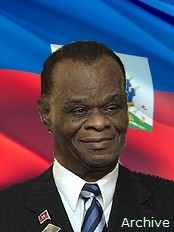 Boniface Alexandre, former Provisional President of Haiti (2004 to 2006, after the fall of J. Bertrand Aristide), said fear that the current political crisis, degenerate into a social situation uncontrollable.
Boniface Alexandre, former Provisional President of Haiti (2004 to 2006, after the fall of J. Bertrand Aristide), said fear that the current political crisis, degenerate into a social situation uncontrollable."The electoral process, to the phase where it is, may lead to civil war whose we will all both responsible and victims" Mr Alexandre warned.
Remember that massive fraud in favor of candidate (Jude Célestin) and the platform in power (INITE), the violence and intimidation of voters in the election on November 28, preceded a wave of violent protests across the country, following the publication of preliminary results contested of the first round. Political crisis that has caused 5 fatalities and over 96 injured, 38 by bullets.
It is not certain that the results of the recount and verification of the minutes by the mission of the Organization of American States (OAS), whose experts are expected to arrive in Port-au-Prince today, is sufficient to bring the calm in a population, whose patience has obviously reached its limits.
Especially since, the OAS lacks credibility and impartiality in the eyes of the population that sees in the agreement "OAS - Provisional Electoral Council (CEP) - Government" a strategy of the international community to legitimize the candidate of power Jude Célestin.
Let's add to this explosive cocktail, the second round originally scheduled for February 16, 2011 which will inevitably be delayed, as admitted by the Head of State. And finally, the departure of President René Préval, the February 7 but could, in the absence of an elected president to replace him at that time, remain in power until May 14, 2011. Which inevitably will be perceived by people as the will of the Head of State to remain in power.
In presence of all these factors, without mentioning civil war, the risk of major slippage is large.
See also:
http://www.haitilibre.com/en/news-1979-haiti-elections-rene-preval-at-the-power-until-may-14-2011.html
http://www.haitilibre.com/article-1999-haiti-elections-tous-les-details-sur-l-entente-oea-gouvernement-cep.html (in french)
http://www.haitilibre.com/en/news-1944-haiti-elections-riots-toll-significantly-undervalued.html
S/ HaitiLibre
Haiti - Social : Disastrous situation for the human rights in 2010
 Me Renan Hedouville, Executive Secretary of the Lawyers Committee for the Respect of Individual Liberties (CARLI), gave last Tuesday, a pessimistic picture of the human rights situation in 2010.
Me Renan Hedouville, Executive Secretary of the Lawyers Committee for the Respect of Individual Liberties (CARLI), gave last Tuesday, a pessimistic picture of the human rights situation in 2010.The earthquake of January, the mass escapes of prisoners, the hurricane season, cholera and political crisis are the main factors that contributed to serious violations of civil right, political and economic citizen, he recalled.
Me Renan Hedouville said that during this year, citizens have been victims of insecurity, the elections were deprived of their right to freely choose their leaders, people with cholera are victims of stigma and discrimination.
As primarily responsible for the deterioration of the human rights, Me Hedouville accuses the political leaders, who failed to give priority to the best interests of the nation and whose position hardliner has worsened the situation.
He accuses the poor governance, the dysfunctional of the state structures and the lack of preventive policy that contributed to the deterioration of the human rights in the country and especially the unwillingness of the political authorities which show a lack of concern face to the different issues of society. He accused the organizations of civil society their passivity.
Recalling that the non-compliance and violations of the human rights also have severe consequences on the economic rights of citizens.
HL/ HaitiLibre
12/29/2010
Haiti - Social : 80 boat people repatriated yesterday in Cap-Haitien
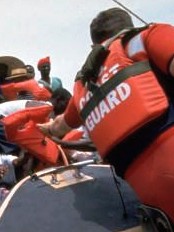 A sailing vessel overloaded, carrying 80 Haitian migrants was spotted Sunday by a Coast Guard helicopter at about 4 miles south of Matthewtown, Bahamas. After a request for assistance under a bilateral agreement with the Government of the Commonwealth of the Bahamas, the ship Escanaba of the coast guard went to the scene to intercept the boat.
A sailing vessel overloaded, carrying 80 Haitian migrants was spotted Sunday by a Coast Guard helicopter at about 4 miles south of Matthewtown, Bahamas. After a request for assistance under a bilateral agreement with the Government of the Commonwealth of the Bahamas, the ship Escanaba of the coast guard went to the scene to intercept the boat.After provided life jackets to the passengers, the Coast Guard has transhipped the Haitians aboard the Escanaba where they received food, water and basic medical care.
The destroyer of the HMBS Nortec RBDF (Royal Bahamas Defense Force), joined the Coast Guard ship and destroyed the boat of migrants, considered dangerous for navigation.
The destroyer HMBS Nortec of the RBDF (Royal Bahamas Defense Force), joined the Coast Guard ship and destroyed the boat of migrants, considered dangerous for navigation.
The Escanaba repatriated 80 migrants yesterday in Cap Haitien in Haiti. Repatriation which is added to an already long list of our compatriots who fled poverty and insecurity, risking their lives in flimsy boats, exploited by unscrupulous traffickers.
PI/ HaitiLibre
Preval alleges unconstitutional judges of the Court of Cassation
 The head of state of Haiti, Rene Preval, displays his opposition to the formation of a transitional government after February 7, 2011. He says he's determined to keep the presidential chair until May 14 to promote the outcome of the election process.
The head of state of Haiti, Rene Preval, displays his opposition to the formation of a transitional government after February 7, 2011. He says he's determined to keep the presidential chair until May 14 to promote the outcome of the election process.All options were rejected by President Préval, who considers himself the only legal and constitutional. He argues that the judges of the Supreme Court were not appointed according to the prescription of the constitution. One judge was appointed by a head of state elected, "he said.
This argument is dismissed by former President Boniface Alexandre. He explained that the interim presidents from the Court of Cassation are heads of state constitutional under Article 149 of the mother. The appointments made by a constitutional president are consistent hammering Mr. Alexander, who had retired three judges of the Supreme Court involved in the case Simeus. He recalled that two other judges retired had made the request themselves.
The label seems unconstitutional judge appoint a judge whose appointment has not been achieved after the procedure. In the absence of large bodies in 2005, applications to the Court of Cassation had not been submitted to the Head of State by the assembled senators.
In this case the President Préval has refrained from commenting on his refusal to appoint constitutional judges from among persons recommended by the senate.
Preval is virtually inevitable because he did not appoint new justices during his tenure. "I could have done. But there were other priorities that need to bring insecurity to a livable level and a consensus government to do. I thought I had time but unfortunately I could not do it, "he added.
LLM / Radio Metropole Haiti
Haiti - Elections : RNDDH little optimistic on the OAS mission
The National Network for the Defence of Human Rights (RNDDH) shows little optimistic about the outcome of the work of the verification mission of Organization of American States (OAS) which has just been signed between the OAS, the Government and the Provisional Electoral Council (CEP).
(In french) http://www.haitilibre.com/article-1999-haiti-elections-tous-les-details-sur-l-entente-oea-gouvernement-cep.html
For Vilès Alizar, Programme Manager at RNDDH, the problem is at a level higher than a simple recount of minutes. Recalling that thousands of voters were prevented from taking part in the elections [1,074,056 voters on 4,694,961 registered] "We must address the problem in its entirety, because the superficial or temporary solutions will not help solve the crisis" adding that "the better is the search of durable solutions based on respect for the rights of citizens to choose their own leaders."
RNDDH also recalls that many government offices and private property have been fires, vandalized and looted during the protest demonstrations that followed the publication of preliminary results and requires that action, not partisan to be taken against perpetrators of these criminal acts.
See also:
http://www.haitilibre.com/en/news-1940-haiti-elections-justice-partisane-at-the-service-of-inite.html
http://www.haitilibre.com/en/news-1914-haiti-elections-verification-process-the-rnddh-denounces.html
http://www.haitilibre.com/en/news-1859-haiti-elections-2010-preliminary-results-official-first-round.html
S/ HaitiLibre
(In french) http://www.haitilibre.com/article-1999-haiti-elections-tous-les-details-sur-l-entente-oea-gouvernement-cep.html
For Vilès Alizar, Programme Manager at RNDDH, the problem is at a level higher than a simple recount of minutes. Recalling that thousands of voters were prevented from taking part in the elections [1,074,056 voters on 4,694,961 registered] "We must address the problem in its entirety, because the superficial or temporary solutions will not help solve the crisis" adding that "the better is the search of durable solutions based on respect for the rights of citizens to choose their own leaders."
RNDDH also recalls that many government offices and private property have been fires, vandalized and looted during the protest demonstrations that followed the publication of preliminary results and requires that action, not partisan to be taken against perpetrators of these criminal acts.
See also:
http://www.haitilibre.com/en/news-1940-haiti-elections-justice-partisane-at-the-service-of-inite.html
http://www.haitilibre.com/en/news-1914-haiti-elections-verification-process-the-rnddh-denounces.html
http://www.haitilibre.com/en/news-1859-haiti-elections-2010-preliminary-results-official-first-round.html
S/ HaitiLibre
Haiti - Agriculture : Cholera Threatens Food Security in Haiti
Currently, FAO (Food and Agriculture Organization) and its partners make an assessment of the impact of cholera on food security and livelihoods of rural people, led by the National Coordination for Food Security (Coordination Nationale de la Sécurité Alimentaire CNSA). The effects of the cholera outbreak have been magnified by the November floods caused by hurricane Tomas which damaged farming infrastructure, damaging up to 78 000 hectares of crops and caused the disease to spread further, resulting in a sanitary crisis for over 50 000 rural families.
According to preliminary results of FAO, the cholera epidemic raised fears that a significant portion of the rice crop in the northwest of Haiti are lost, many farmers avoid harvest rice fearing that the rivers and canals that irrigate rice fields and nearby fields are infected.
Some reports also state that consumers are hesitant or refuse to buy agricultural products from the areas directly affected by cholera, an aggravating factor for agricultural trade in the region. While stressing that lost crops affect food production and, consequently, food security and livelihoods of populations, FAO works closely with Haitian authorities and UN agencies specializing in health and hygiene public to provide to farmers the appropriate information on precautions to take in the fields.
According to Etienne Peterschmitt, Senior Emergency and Rehabilitation Coordinator for FAO in Haiti, it is extremely important that disease transmission mitigation measures specifically target farm communities and even more to the point, farm workers.
More sensitization designed to target rural low-income communities' needs to be done in person through hands on training and outreach. In collaboration with the Haitian Ministry of Agriculture and Health, FAO has launched an information campaign to educate farmers on issues of hygiene and sanitation.
Without a timely response to the damage caused by floods and cholera to Haitian agriculture, food security could plunge, worsening the effects of last January's earthquake on the poor rural population.
S/ HaitiLibre
According to preliminary results of FAO, the cholera epidemic raised fears that a significant portion of the rice crop in the northwest of Haiti are lost, many farmers avoid harvest rice fearing that the rivers and canals that irrigate rice fields and nearby fields are infected.
Some reports also state that consumers are hesitant or refuse to buy agricultural products from the areas directly affected by cholera, an aggravating factor for agricultural trade in the region. While stressing that lost crops affect food production and, consequently, food security and livelihoods of populations, FAO works closely with Haitian authorities and UN agencies specializing in health and hygiene public to provide to farmers the appropriate information on precautions to take in the fields.
According to Etienne Peterschmitt, Senior Emergency and Rehabilitation Coordinator for FAO in Haiti, it is extremely important that disease transmission mitigation measures specifically target farm communities and even more to the point, farm workers.
More sensitization designed to target rural low-income communities' needs to be done in person through hands on training and outreach. In collaboration with the Haitian Ministry of Agriculture and Health, FAO has launched an information campaign to educate farmers on issues of hygiene and sanitation.
Without a timely response to the damage caused by floods and cholera to Haitian agriculture, food security could plunge, worsening the effects of last January's earthquake on the poor rural population.
S/ HaitiLibre
Haiti - Social : The causes of the failure of the international community in Haiti
In an interview published Monday in the newspaper "Le Temps" in Switzerland, the representative of Secretary General of the OAS Seitenfus Ricardo explains the causes and errors which led to the failure of the international community in Haiti.
Ten thousand peacekeepers in Haiti. In your view, a productive presence ?
Ricardo Seitenfus : The system of dispute prevention within the UN system is not adapted to the Haitian context. Haiti is not an international threat. We are not experiencing civil war. Haiti is not Iraq or Afghanistan. And yet the Security Council, since lack of alternative, imposed peacekeepers since 2004 after the departure of President Aristide. Since 1990, we are here in our eighth UN mission. Haiti since 1986 and saw the departure of Jean-Claude Duvalier's what I call a low intensity conflict. We are faced with struggles for power among political actors who do not respect the democratic game. But it seems to me that Haiti, the international arena, essentially paying its proximity to the United States. Haiti has been the subject of negative attention from the international system. It was for the UN to freeze the power and transform the Haitian prisoners in their own island. The Anguish of boat people largely explain the decisions of international vis-à-vis Haiti. We want at any price they stay home.
What prevents the normalization of the Haitian case ?
Ricardo Seitenfus : For two hundred years, the presence of foreign troops has alternated with that of dictators. It is the force that defines international relations with Haiti and never dialogue. The original sin of Haiti, on the world stage is his release. Haitians commit unacceptable in 1804: a crime of lese-majeste for a troubled world. The West was then a world of colonialism, slavery and racist base its wealth on the exploitation of conquered lands. So the Haitian revolutionary model scares superpowers. The United States does not recognize Haiti's independence in 1865. And France requires payment of a ransom to accept this release. From the beginning, independence is compromised and hampered the development of the country. The world has never known how to deal with Haiti, so he ended up ignoring it. Began two hundred years of solitude on the international stage. Today, the UN has blindly Chapter 7 of its charter, it deploys its troops to impose its peace operation. It solves nothing, is worse. We want to make Haiti a capitalist country, an export platform for U.S. market is absurd. Haiti must return to what it is, that is to say, a predominantly agricultural country still fundamentally imbued customary law. The country is continually described in terms of its violence. But without a state, the level of violence reaches yet a fraction of that of Latin America. There are elements in this society that have prevented the violence from spreading beyond measure.
Is not a resignation to see a nation unassimilable in Haiti, whose only horizon is a return to traditional values ?
Ricardo Seitenfus : There is a part of Haiti that is modern, urban and touring abroad. An estimated 4 million the number of Haitians who live outside their borders. This is an open country in the world. I do not dream of returning to the sixteenth century, an agrarian society. Haiti but lives under the influence of international NGOs, charity universal. Over 90% of education and health are in private hands. The country has no public resources to be able to operate in a minimal state system. The UN fails to take account of cultural traits. Summarize in Haiti peace operation is to make the economy the real challenges facing the country. The problem is socio-economic development. When the unemployment rate reached 80%, it is unbearable to deploy a stabilization mission. There is nothing to stabilize and build everything.
Haiti is one of the most subsidized in the world and yet the situation has only deteriorated over the past twenty-five years. Why ?
Ricardo Seitenfus : Emergency aid is effective. But when it becomes structural when it replaces the state in all its missions, it leads to a collective lack of responsibility. If there is evidence of the failure of international aid, is Haiti. The country became a Mecca. The earthquake of 12 January and the cholera epidemic only accentuate this phenomenon. The international community has the feeling of having to repeat every day that it ended the previous day. Fatigue of Haiti begins to emerge. This small nation has surprised the world conscience to disasters increasingly huge. I hope that in the plight of 12 January, the world would understand that he had gone wrong with Haiti. Unfortunately, it has reinforced the same policy. Instead of taking stock, we sent more soldiers. We must build roads, erect dams, participate in the organization of the State, the judicial system. The UN says it has no mandate for that. Its mandate in Haiti is to keep the peace of the cemetery.
What role do NGOs play in this bankruptcy ?
Ricardo Seitenfus : Since the earthquake, Haiti has become a crossroad. For transnational NGOs, Haiti has become a place of forced passage. I would say even worse than that of training. The age of cooperating who arrived after the earthquake is very low, they landed in Haiti without any experience. And Haiti, I can tell you, is not suitable for amateurs. After Jan. 12, because of massive recruitment, the professional quality has declined significantly. There is an evil or perverse relationship between the strength of NGOs and the weakness of the Haitian State. Some NGOs exist only because of the misfortune of Haiti.
What mistakes were made after the earthquake?
Ricardo Seitenfus : Faced with the massive importation of consumer goods to feed the homeless, the situation of Haitian agriculture has yet péjorée. The country offers a free field to all humanitarian experiences. It is unacceptable from the moral standpoint to consider Haiti as a laboratory. Reconstruction of Haiti and the promise that we hold the promise of $ 11 billion inflame lust. It seems that a lot of people come to Haiti, not in Haiti but to do business. For me American is a disgrace, an affront to our conscience. An example: the Haitian doctors that Cuba shape. More than 500 have been educated in Havana. Nearly half of them, then they should be in Haiti, working today in the United States, Canada or France. The Cuban revolution is currently financing the training of human resources for its capitalist neighbors...
We constantly described Haiti as the margin of the world, you feel rather the country as a concentrate of our contemporary world...?
Ricardo Seitenfus : It's concentrate our tragedies and failures of international solidarity. We do not rise to the challenge. The world press has described in Haiti and chaos. The reaction of public opinion is not expected. For her, Haiti is one of the worst countries in the world. We must go to the Haitian culture, we must go to the land. I think there are too many doctors at the bedside and the majority of these doctors are economists. But in Haiti, we need anthropologists, sociologists, historians, political scientists and even theologians. Haiti is too complex for people who are pressed, cooperatives are in a hurry. Nobody takes the time nor the taste has to try to understand what I might call the soul of Haiti. Haitians have seized property, which we believe, we the international community as a milking cow. They want to take advantage of their presence and they do so with extraordinary mastery. If we consider only the Haitians by the money we make is that we went that way.
Beyond the admission of failure, what solutions do you offer ?
Ricardo Seitenfus : In two months, I completed a two-year mission in Haiti. To stay here and not be overwhelmed by what I see, I had to create a number of psychological defenses. I wanted to remain an independent voice despite the weight of the organization I represent. I kept because I wanted to express my profound doubts and tell the world that is enough. This is enough to play with Haiti. January 12, taught me that there is tremendous potential for solidarity in the world. Even if we should not forget that in the early days, it is the Haitians themselves, bare hands, who tried to save their loved ones. Compassion has been very important in an emergency. But charity can not be the driving force in international relations. These are autonomy, sovereignty, fair trade, respect for others should be. We need to think simultaneously providing export opportunities for Haiti but also protect the family farm which is essential for the country. Haiti is the last untapped Caribbean paradise for tourism, with 1700 kilometers of pristine coastline and we need to encourage cultural tourism and avoid paving the way for a new Eldorado of mass tourism. The lessons we give are ineffective for too long. Reconstruction and the accompaniment of a rich society is one of the last great human adventure. 200 years ago, Haiti has illuminated the history of mankind and the human rights. We now let a chance for Haitians to confirm their vision.
HL/ Arnaud Robert / Le Temps - Monday December 20, 2010
Ten thousand peacekeepers in Haiti. In your view, a productive presence ?
Ricardo Seitenfus : The system of dispute prevention within the UN system is not adapted to the Haitian context. Haiti is not an international threat. We are not experiencing civil war. Haiti is not Iraq or Afghanistan. And yet the Security Council, since lack of alternative, imposed peacekeepers since 2004 after the departure of President Aristide. Since 1990, we are here in our eighth UN mission. Haiti since 1986 and saw the departure of Jean-Claude Duvalier's what I call a low intensity conflict. We are faced with struggles for power among political actors who do not respect the democratic game. But it seems to me that Haiti, the international arena, essentially paying its proximity to the United States. Haiti has been the subject of negative attention from the international system. It was for the UN to freeze the power and transform the Haitian prisoners in their own island. The Anguish of boat people largely explain the decisions of international vis-à-vis Haiti. We want at any price they stay home.
What prevents the normalization of the Haitian case ?
Ricardo Seitenfus : For two hundred years, the presence of foreign troops has alternated with that of dictators. It is the force that defines international relations with Haiti and never dialogue. The original sin of Haiti, on the world stage is his release. Haitians commit unacceptable in 1804: a crime of lese-majeste for a troubled world. The West was then a world of colonialism, slavery and racist base its wealth on the exploitation of conquered lands. So the Haitian revolutionary model scares superpowers. The United States does not recognize Haiti's independence in 1865. And France requires payment of a ransom to accept this release. From the beginning, independence is compromised and hampered the development of the country. The world has never known how to deal with Haiti, so he ended up ignoring it. Began two hundred years of solitude on the international stage. Today, the UN has blindly Chapter 7 of its charter, it deploys its troops to impose its peace operation. It solves nothing, is worse. We want to make Haiti a capitalist country, an export platform for U.S. market is absurd. Haiti must return to what it is, that is to say, a predominantly agricultural country still fundamentally imbued customary law. The country is continually described in terms of its violence. But without a state, the level of violence reaches yet a fraction of that of Latin America. There are elements in this society that have prevented the violence from spreading beyond measure.
Is not a resignation to see a nation unassimilable in Haiti, whose only horizon is a return to traditional values ?
Ricardo Seitenfus : There is a part of Haiti that is modern, urban and touring abroad. An estimated 4 million the number of Haitians who live outside their borders. This is an open country in the world. I do not dream of returning to the sixteenth century, an agrarian society. Haiti but lives under the influence of international NGOs, charity universal. Over 90% of education and health are in private hands. The country has no public resources to be able to operate in a minimal state system. The UN fails to take account of cultural traits. Summarize in Haiti peace operation is to make the economy the real challenges facing the country. The problem is socio-economic development. When the unemployment rate reached 80%, it is unbearable to deploy a stabilization mission. There is nothing to stabilize and build everything.
Haiti is one of the most subsidized in the world and yet the situation has only deteriorated over the past twenty-five years. Why ?
Ricardo Seitenfus : Emergency aid is effective. But when it becomes structural when it replaces the state in all its missions, it leads to a collective lack of responsibility. If there is evidence of the failure of international aid, is Haiti. The country became a Mecca. The earthquake of 12 January and the cholera epidemic only accentuate this phenomenon. The international community has the feeling of having to repeat every day that it ended the previous day. Fatigue of Haiti begins to emerge. This small nation has surprised the world conscience to disasters increasingly huge. I hope that in the plight of 12 January, the world would understand that he had gone wrong with Haiti. Unfortunately, it has reinforced the same policy. Instead of taking stock, we sent more soldiers. We must build roads, erect dams, participate in the organization of the State, the judicial system. The UN says it has no mandate for that. Its mandate in Haiti is to keep the peace of the cemetery.
What role do NGOs play in this bankruptcy ?
Ricardo Seitenfus : Since the earthquake, Haiti has become a crossroad. For transnational NGOs, Haiti has become a place of forced passage. I would say even worse than that of training. The age of cooperating who arrived after the earthquake is very low, they landed in Haiti without any experience. And Haiti, I can tell you, is not suitable for amateurs. After Jan. 12, because of massive recruitment, the professional quality has declined significantly. There is an evil or perverse relationship between the strength of NGOs and the weakness of the Haitian State. Some NGOs exist only because of the misfortune of Haiti.
What mistakes were made after the earthquake?
Ricardo Seitenfus : Faced with the massive importation of consumer goods to feed the homeless, the situation of Haitian agriculture has yet péjorée. The country offers a free field to all humanitarian experiences. It is unacceptable from the moral standpoint to consider Haiti as a laboratory. Reconstruction of Haiti and the promise that we hold the promise of $ 11 billion inflame lust. It seems that a lot of people come to Haiti, not in Haiti but to do business. For me American is a disgrace, an affront to our conscience. An example: the Haitian doctors that Cuba shape. More than 500 have been educated in Havana. Nearly half of them, then they should be in Haiti, working today in the United States, Canada or France. The Cuban revolution is currently financing the training of human resources for its capitalist neighbors...
We constantly described Haiti as the margin of the world, you feel rather the country as a concentrate of our contemporary world...?
Ricardo Seitenfus : It's concentrate our tragedies and failures of international solidarity. We do not rise to the challenge. The world press has described in Haiti and chaos. The reaction of public opinion is not expected. For her, Haiti is one of the worst countries in the world. We must go to the Haitian culture, we must go to the land. I think there are too many doctors at the bedside and the majority of these doctors are economists. But in Haiti, we need anthropologists, sociologists, historians, political scientists and even theologians. Haiti is too complex for people who are pressed, cooperatives are in a hurry. Nobody takes the time nor the taste has to try to understand what I might call the soul of Haiti. Haitians have seized property, which we believe, we the international community as a milking cow. They want to take advantage of their presence and they do so with extraordinary mastery. If we consider only the Haitians by the money we make is that we went that way.
Beyond the admission of failure, what solutions do you offer ?
Ricardo Seitenfus : In two months, I completed a two-year mission in Haiti. To stay here and not be overwhelmed by what I see, I had to create a number of psychological defenses. I wanted to remain an independent voice despite the weight of the organization I represent. I kept because I wanted to express my profound doubts and tell the world that is enough. This is enough to play with Haiti. January 12, taught me that there is tremendous potential for solidarity in the world. Even if we should not forget that in the early days, it is the Haitians themselves, bare hands, who tried to save their loved ones. Compassion has been very important in an emergency. But charity can not be the driving force in international relations. These are autonomy, sovereignty, fair trade, respect for others should be. We need to think simultaneously providing export opportunities for Haiti but also protect the family farm which is essential for the country. Haiti is the last untapped Caribbean paradise for tourism, with 1700 kilometers of pristine coastline and we need to encourage cultural tourism and avoid paving the way for a new Eldorado of mass tourism. The lessons we give are ineffective for too long. Reconstruction and the accompaniment of a rich society is one of the last great human adventure. 200 years ago, Haiti has illuminated the history of mankind and the human rights. We now let a chance for Haitians to confirm their vision.
HL/ Arnaud Robert / Le Temps - Monday December 20, 2010
12/28/2010
Haiti - CARICOM : Strengthen the Haitian government’s institutional capacity
Officials of the CARICOM (Caribbean Community) will meet with their Haitian counterparts the January 5, 6 and 7 in order to develop proposals for submission to the Interim Haiti Recovery Commission (IHRC) in agreement with the Haitian Prime Minister Jean Max Bellerive.
The meeting will also allow to discuss and finalize other arrangements to strengthen the Haitian government’s institutional capacity. The initiative also plans to add at this meeting, representatives of the private sector and the Haitian diaspora. Experts in public administration and fiscal policy will also be part of the group of specialists who will work directly with the Haitian government.
According to organizers, the improvement of institutional capacity in Haiti was an idea promoted by former Jamaican Prime Minister Percival Patterson, during a recent visit to Haiti with the head of government. The two parties had concluded an agreement to revise the national plan of recovery and development in Haiti.
With the help of the IHRC, the CARICOM intends to rapidly implement priority projects for the government of Haiti. The CARICOM will also provide qualified staff to develop an agenda by order of relevance.
S/ HaitiLibre
The meeting will also allow to discuss and finalize other arrangements to strengthen the Haitian government’s institutional capacity. The initiative also plans to add at this meeting, representatives of the private sector and the Haitian diaspora. Experts in public administration and fiscal policy will also be part of the group of specialists who will work directly with the Haitian government.
According to organizers, the improvement of institutional capacity in Haiti was an idea promoted by former Jamaican Prime Minister Percival Patterson, during a recent visit to Haiti with the head of government. The two parties had concluded an agreement to revise the national plan of recovery and development in Haiti.
With the help of the IHRC, the CARICOM intends to rapidly implement priority projects for the government of Haiti. The CARICOM will also provide qualified staff to develop an agenda by order of relevance.
S/ HaitiLibre
Haiti - Cholera Epidemic : Donation of a water treatment plant
NGOs Pharmacists Without Borders (PSF) and Kids Without Borders in Haiti finalize the sending of a water treatment plant with a capacity of 150,000 liters of water per day, which will meet the needs of 10,000 people.
As reported yesterday PSF, ensuring access to safe drinking water, by installing a treatment plant water, is one of the most effective measures to prevent the spread of cholera. Besides the installation of a water treatment plant, PSF in collaboration with the Spanish Agency for International Cooperation (AECI) will send serums, gels, disinfectants and material to administer intravenous serum to patients.
The implementation of this project was made possible thanks to funds collected during a campaign after the earthquake of January, involving many institutions in the pharmaceutical sector, schools, retail pharmacies and universities.
S/ HaitiLibre
As reported yesterday PSF, ensuring access to safe drinking water, by installing a treatment plant water, is one of the most effective measures to prevent the spread of cholera. Besides the installation of a water treatment plant, PSF in collaboration with the Spanish Agency for International Cooperation (AECI) will send serums, gels, disinfectants and material to administer intravenous serum to patients.
The implementation of this project was made possible thanks to funds collected during a campaign after the earthquake of January, involving many institutions in the pharmaceutical sector, schools, retail pharmacies and universities.
S/ HaitiLibre
Haiti - France : 75 Haitians arrested at the airport of Orly and Charles de Gaulle
32 Haitians who wanted to join family in France were arrested last Thursday. 16 Haitian citizens at Orly airport and 16 others at Charles de Gaulle airport where they were placed in the waiting area. 43 other Haitians were arrested Sunday at the Charles de Gaulle airport in similar irregular conditions.
These Haitians arrived with visas for travel to Benin. They were arrested by officials of the border police (PAF) who suspected them of using transit visas to settle illegally in France.
The immigration authorities believe that these trips are not spontaneous and that there is probably an organizer, a pathway behind these trips, pointing out that these people can be legally held in the waiting area at the airport until 96 hours, then they are presented to a judge who decides their continuation on French territory or their eviction.
On Monday, several Haitians have appeared before judges. In Bobigny, the judge ordered the release of 16 of them, in Créteil the judge decided to release 14 of them for procedural defects or because of their guaranteed of representation. The prosecution has appealed this decision, justifying that they "do not have papers in good and due form, and therefore can not settle in France". Those in custody are not allowed to enter in French territory, but they can apply for political asylum.
"We can not congratulate on one side the children accommodated before the cameras and on the other side keep in the waiting area, before their eviction, those who wish to join their families" denounced Richard Moyon, a militant of the Association Network Education Without Borders (RESF).
HL/ HaitiLibre
These Haitians arrived with visas for travel to Benin. They were arrested by officials of the border police (PAF) who suspected them of using transit visas to settle illegally in France.
The immigration authorities believe that these trips are not spontaneous and that there is probably an organizer, a pathway behind these trips, pointing out that these people can be legally held in the waiting area at the airport until 96 hours, then they are presented to a judge who decides their continuation on French territory or their eviction.
On Monday, several Haitians have appeared before judges. In Bobigny, the judge ordered the release of 16 of them, in Créteil the judge decided to release 14 of them for procedural defects or because of their guaranteed of representation. The prosecution has appealed this decision, justifying that they "do not have papers in good and due form, and therefore can not settle in France". Those in custody are not allowed to enter in French territory, but they can apply for political asylum.
"We can not congratulate on one side the children accommodated before the cameras and on the other side keep in the waiting area, before their eviction, those who wish to join their families" denounced Richard Moyon, a militant of the Association Network Education Without Borders (RESF).
HL/ HaitiLibre
Haiti - Benin : 110 Haitian scholars will make their studies in Benin
After Senegal, and its 163 scholars, it was the turn of Benin to open the doors of its universities to 110 young Haitians. Benin had proposed last September to welcome scholarship students in its universities. However, this agreement took time to materialize because of some antecedents in cases of scholarships between the two countries.
"Arriving at the ministry in 2008, we discovered that about twenty young scholars from the Ministry of Sports in Benin were in a difficult situation and fifteen others were left to themselves without being able to study. We could not claimed anything to the state of Benin because no agreement bound us on the conditions for the granting of scholarships" has informed the Minister of Sports, Evans Lescouflair. "We required that the government of Benin is committed in an agreement between the State of Benin and the Haitian state which specifies the conditions under which will be received, trained, fed and housed Haitian nationals through the Ministry of Foreign Affairs before accepting these scholarships."
Benin has officially responded positively to these demands and signing an agreement with the Haitian State to receive, accommodate, and provide to 110 young Haitians the framework for their higher education:
The inscriptions for the scholarships of Benin were held from December 16 to 21, 2010 the entrance exam on December 23. The 110 youth who will be selected should leave Haiti between January 3 and 6, 2011 to Benin to begin their university studies.
See also:
http://www.haitilibre.com/en/news-1227-haiti-senegal-other-countries-of-africa-could-host-haitian-students.html
http://www.haitilibre.com/en/news-1980-haiti-senegal-the-haitian-students-at-the-table-of-cardinal-adrien-sarr.html
http://www.haitilibre.com/en/news-1421-haiti-senegal-163-haitian-students-in-the-land-of-their-ancestors.html
http://www.haitilibre.com/en/news-1504-haiti-senegal-the-integration-of-haitian-students-a-shared-responsibility.html
http://www.haitilibre.com/en/news-1462-haiti-senegal-after-the-euphoric-reception-the-first-disappointments.html
http://www.haitilibre.com/en/news-1611-haiti-senegal-no-special-treatment-for-haitians.html
BF/ HaitiLibre
"Arriving at the ministry in 2008, we discovered that about twenty young scholars from the Ministry of Sports in Benin were in a difficult situation and fifteen others were left to themselves without being able to study. We could not claimed anything to the state of Benin because no agreement bound us on the conditions for the granting of scholarships" has informed the Minister of Sports, Evans Lescouflair. "We required that the government of Benin is committed in an agreement between the State of Benin and the Haitian state which specifies the conditions under which will be received, trained, fed and housed Haitian nationals through the Ministry of Foreign Affairs before accepting these scholarships."
Benin has officially responded positively to these demands and signing an agreement with the Haitian State to receive, accommodate, and provide to 110 young Haitians the framework for their higher education:
- Administrative Sciences ( Marketing and Organisation Management, Planning, Transport Management and Logistics)
- Economic and Financial Sciences (Economics and International Finance, Economic and Political Analysis)
- Biological and Environmental Sciences (17 sectors)
- Human and Social Sciences (Journalism, Economics and Rural Extension)
- Science and Technology (Science and Information Technology, computer and statistical management, computer engineering and telecommunications).
The inscriptions for the scholarships of Benin were held from December 16 to 21, 2010 the entrance exam on December 23. The 110 youth who will be selected should leave Haiti between January 3 and 6, 2011 to Benin to begin their university studies.
See also:
http://www.haitilibre.com/en/news-1227-haiti-senegal-other-countries-of-africa-could-host-haitian-students.html
http://www.haitilibre.com/en/news-1980-haiti-senegal-the-haitian-students-at-the-table-of-cardinal-adrien-sarr.html
http://www.haitilibre.com/en/news-1421-haiti-senegal-163-haitian-students-in-the-land-of-their-ancestors.html
http://www.haitilibre.com/en/news-1504-haiti-senegal-the-integration-of-haitian-students-a-shared-responsibility.html
http://www.haitilibre.com/en/news-1462-haiti-senegal-after-the-euphoric-reception-the-first-disappointments.html
http://www.haitilibre.com/en/news-1611-haiti-senegal-no-special-treatment-for-haitians.html
BF/ HaitiLibre
12/27/2010
Haiti - Humanitarian : First Mission of Paraguay in Haiti
A Paraguayan contingent is arrived in Haiti shortly before Christmas to help rebuild the country, as part of the UN Mission for Stabilization in Haiti (Minustah). This is the first humanitarian assistance mission deployed by Paraguay in a foreign country.
Composed of five senior officers, 15 junior and 80 NCOs, these men were trained for 3 years at the joint Training Center of the operations of the Peace. Before leaving, Lorenzo Jimenez, the UN representative in Paraguay, presented the flag of the world organization to the company commander.
This contingent of the Navy and the Paraguayan air force, equipped with trucks, excavators and tractors, will carry out work of road construction, housing, drilling of wells and water purification.
Recall that a month after the earthquake of last January, Paraguay had created a permanent commission to assess the needs of Haiti and to provide an assistance for the development in four specific areas: public works, health, sanitation and agriculture.
S/ HaitiLibre
Composed of five senior officers, 15 junior and 80 NCOs, these men were trained for 3 years at the joint Training Center of the operations of the Peace. Before leaving, Lorenzo Jimenez, the UN representative in Paraguay, presented the flag of the world organization to the company commander.
This contingent of the Navy and the Paraguayan air force, equipped with trucks, excavators and tractors, will carry out work of road construction, housing, drilling of wells and water purification.
Recall that a month after the earthquake of last January, Paraguay had created a permanent commission to assess the needs of Haiti and to provide an assistance for the development in four specific areas: public works, health, sanitation and agriculture.
S/ HaitiLibre
Haiti - Police : 24 PNH agents trained in Colombia
24 Haitian National Police (PNH) agents are returned in Haiti, after having participated, to a U.S-funded training on anti-kidnapping and counternarcotics in Colombia.
This successful training course, facilitated by the U.S. embassies in Port-au-Prince and Bogota and conducted by the Colombian National Police at their Jungla training center, is the beginning of what promises to be a long-term regional training model. This highlights the U.S. commitment to build the capacity of the Haitian National Police through innovative training opportunities.
This same group of PNH agents are reportedly to return to Colombia in 2011 for a second phase of training to emphasize urban operations and planning for control of civil disturbance.
HL/ HaitiLibre
This successful training course, facilitated by the U.S. embassies in Port-au-Prince and Bogota and conducted by the Colombian National Police at their Jungla training center, is the beginning of what promises to be a long-term regional training model. This highlights the U.S. commitment to build the capacity of the Haitian National Police through innovative training opportunities.
This same group of PNH agents are reportedly to return to Colombia in 2011 for a second phase of training to emphasize urban operations and planning for control of civil disturbance.
HL/ HaitiLibre
Subscribe to:
Posts (Atom)
